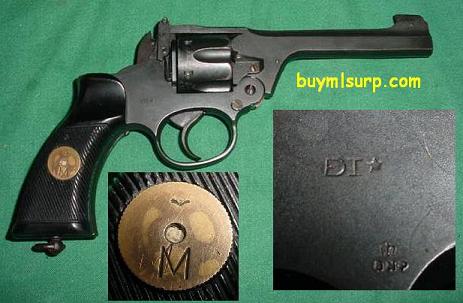GALLERY ONLY. NOT FOR SALE. INFO ONLY.
G-Vg Bore, 80% finish. Marked Cal .38 and 42 with broad arrow on top of barrel.Marked DI*. Manufactured RSAF Middlesex UK.

Enfield No 2 Mk I Revolver
Type: Service pistol
Place of origin: United Kingdom
Service history: In service 1932–1963
Used by: United Kingdom & Colonies, British Commonwealth,
Wars World War II, Korean War, British colonial conflicts, numerous others
Production history
Designer: RSAF Enfield, Webley & Scott
Designed: 1928
Manufacturer: RSAF Enfield
Produced: 1932–1957
Number built: approx 270,000
Variants: Enfield No 2 Mk I*, Enfield No 2 Mk I**
Specifications:
Weight 1.7lb (765g), unloaded
Length 10.25in. (260 mm)
Cartridge: .380" Revolver Mk IIz
Caliber: .38/200
Action: Double Action revolver (Mk I* and Mk I** Double Action Only)
Rate of fire: 20–30 rounds/minute
Muzzle velocity: 570ft/s (170m/s)
Effective range: 15yds
Maximum range: 200yds
Feed system: 6-round cylinder
Sights: fixed front post and rear notch
After the First World War, it was decided by the British Government that a .38 calibre (9.65 mm) pistol firing a 200 grain (13 g) bullet would be as effective as the .455 calibre (11.6 mm) round. There is some doubt as to how true this actually was, as the .38/200 round gives comparable performance to the modern .38 Special cartridge—which is not nearly as powerful as the .455 Webley round.
Enfield No. 2 Mk I Revolver
Webley Mk IV .38/200 revolver. The similarities between the Webley and Enfield designs are rather obvious.Nonetheless, the British firm of Webley & Scott tendered their Webley Mk IV revolver in .38/200 calibre. Rather than adopting it, the British authorities took the design to the Government-run Royal Small Arms Factory at Enfield, and the Enfield factory came up with a revolver that was very similar to the Webley Mk IV .38, but internally slightly different. The Enfield-designed pistol was quickly accepted under the designation Revolver, No 2 Mk I, and was adopted in 1932, followed in 1938 by the Mk I* (spurless hammer, double action only), and finally the Mk I** (simplified for wartime production) in 1942.
Webley sued the British Government for £2,250, being "costs involved in the research and design" of the revolver. Their action was contested by Enfield, who stated that the Enfield No 2 Mk I was actually designed by Captain Boys (the Assistant Superintendent of Design, famous for the Boys Rifle) with assistance from Webley & Scott, and not the other way around—accordingly, their claim was denied. By way of compensation, however, the Royal Commission on Awards to Inventors awarded Webley & Scott £1,250.
There were two main variants of the Enfield No 2 Mk I revolver- the Mk I*, which had a spurless hammer and was double action only, meaning that the hammer could not be thumb-cocked by the shooter for each shot, and the Mk I**, which was a variant of the Mk I* simplified for wartime production in 1942, but discontinued shortly thereafter as a result of safety concerns over some of the introduced modifications.
VARIANTS
The vast majority of Enfield No 2 Mk I revolvers were modified to Mk I* during WWII, generally as they came in for repair or general maintenance; the official explanation of the change to the Mk I* version was that the Tank Corps had complained the spur on the hammer was catching on protrusions inside tanks, but most historians nowadays believe that the real reason was that the Mk I* version was cheaper and faster to manufacture. The No 2 Mk I* is at least as accurate as any other service pistol of its time in normal short-range combat situations, because of the relatively light double action trigger pull. It is not, however, the best choice for precision shooting—the double action pull will throw the most competent shooter's aim off enough to noticeably affect accuracy at ranges of more than 15 yards or so. Some unit Armourers are known to have retrofitted the Enfield No 2 Mk I* back to the Mk I variant, but this was never an official policy and appears to have been done on an individual basis. Despite officially being declared obsolete at the end of WWII, the Enfield (and Webley revolvers) were not completely phased out in favour of the Browning Hi-Power until April 1969.
The Enfield No 2 is very fast to reload—as are all British top-break revolvers—because of its automatic ejector, which simultaneously removes all six cases from the cylinder. A modern speedloader designed for Smith & Wesson K-Frame revolvers will function with any of the British .38/200 top-break revolvers, further speeding reloading.
British combat experience during WWII with the .38/200 Enfield revolvers during WWII seemed to confirm that, for the average soldier, the Enfield No. 2 Mk I could be used far more effectively than the bulkier and heavier .455 calibre Webley revolvers that had been issued during WWI. Despite this, the Enfield No. 2 Mk I* revolvers were not popular with troops, many of whom took the first available opportunity to dump them in favour of Smith & Wesson, Colt, or Webley revolvers.
Other manufacturers
The vast majority of Enfield No 2 revolvers were made by RSAF (Royal Small Arms Factory) Enfield, but wartime necessities meant that numbers were produced elsewhere. Albion Motors in Scotland made the Enfield No 2 Mk I* from 1941–1943, whereupon the contract for production was passed onto Coventry Gauge & Tool Co. By 1945, 24,000 Enfield No 2 Mk I* and Mk I** revolvers had been produced by Albion/CG&T. The Howard Auto Cultivator Company (HAC) in New South Wales, Australia tooled up and began manufacturing the Enfield No 2 Mk I* and I** revolvers in 1941, but the production run was very limited (estimated at around 350 or so revolvers in total), and the revolvers produced were criticised for being non-interchangeable, even with other HAC-produced revolvers. Very few HAC revolvers are known to exist, and it is thought by many collectors that most of the HAC
